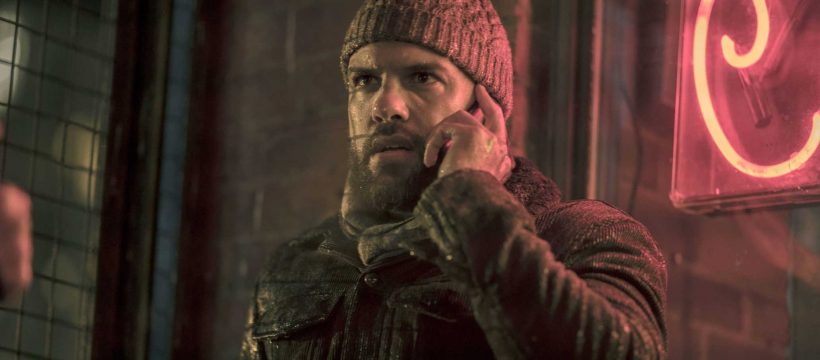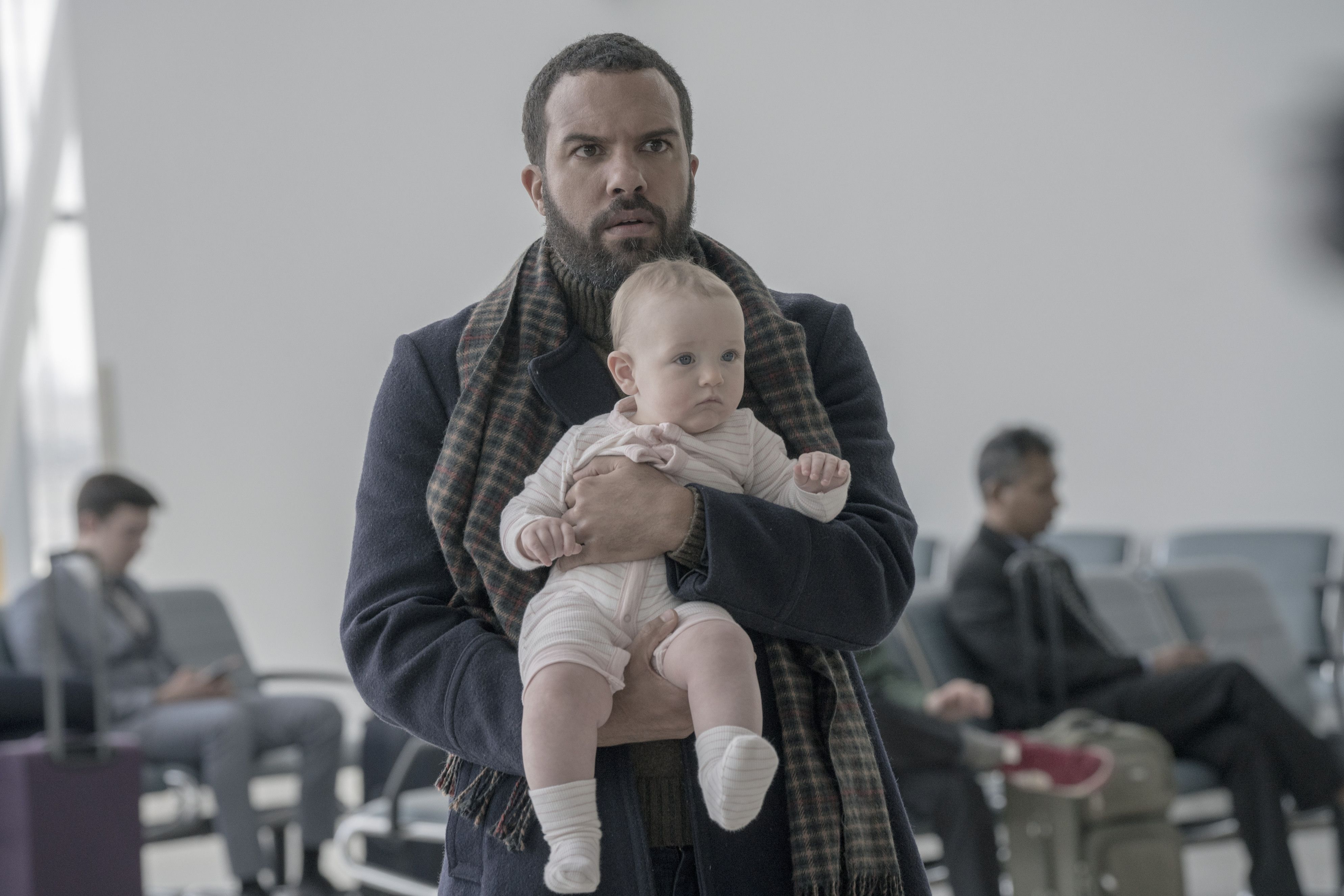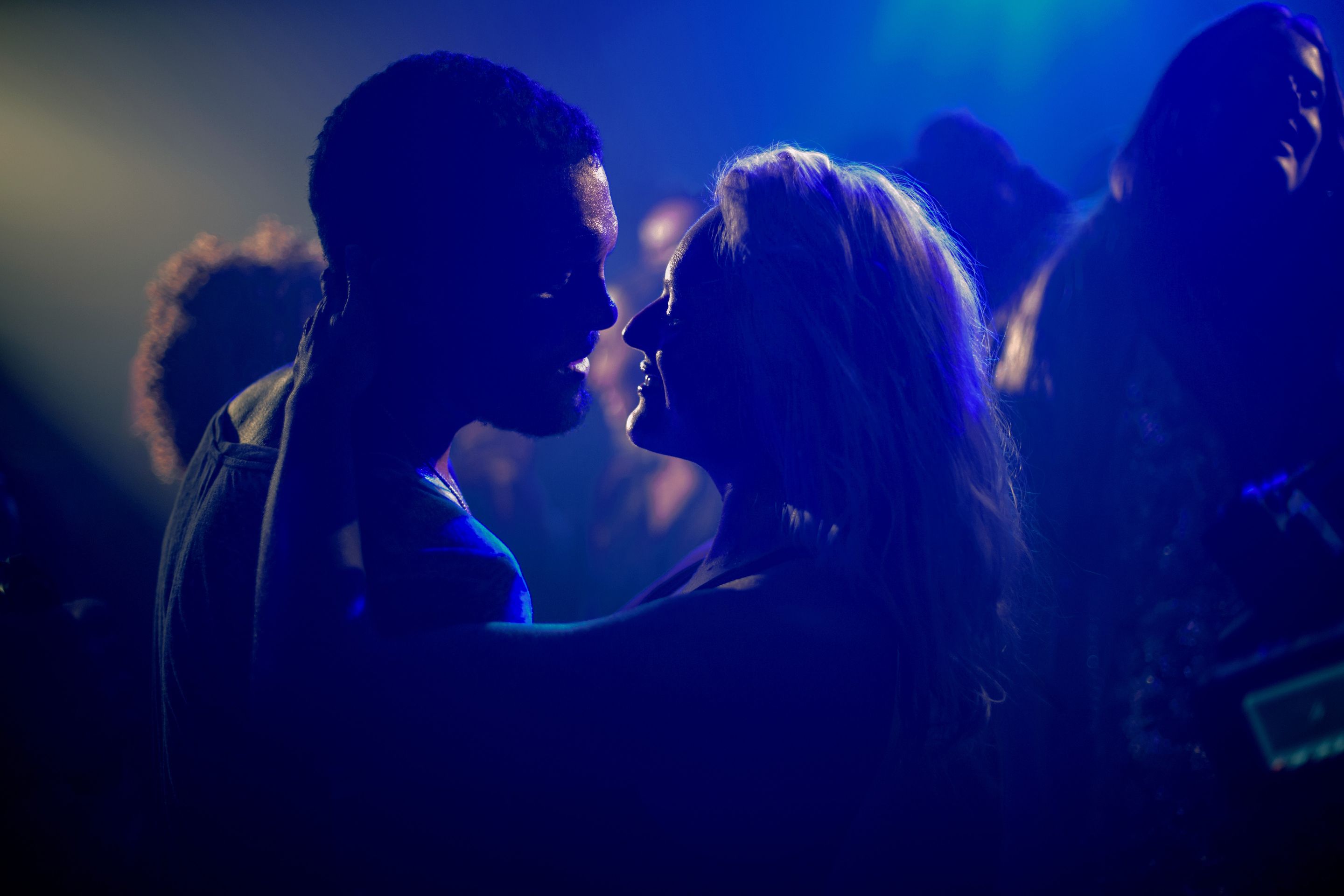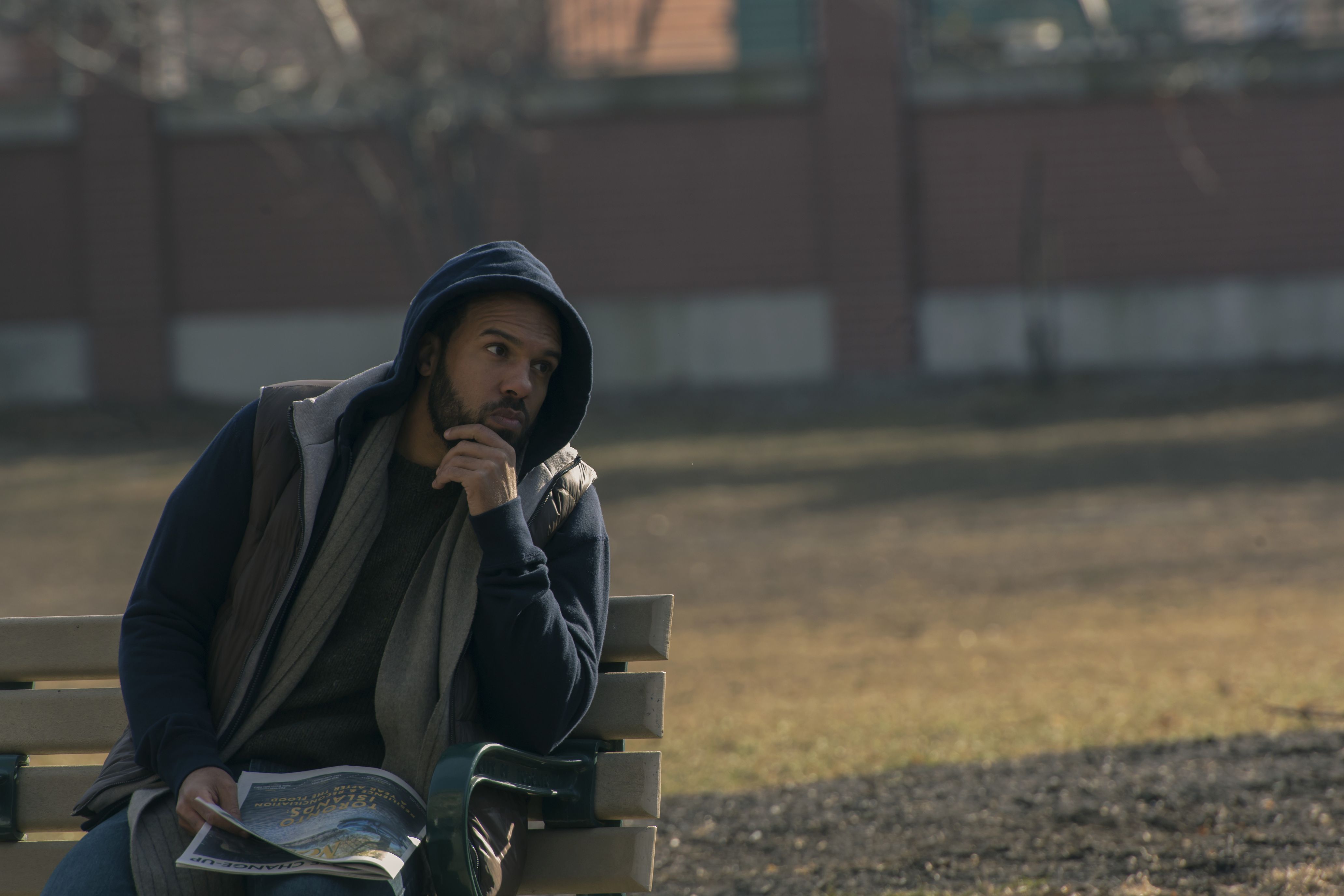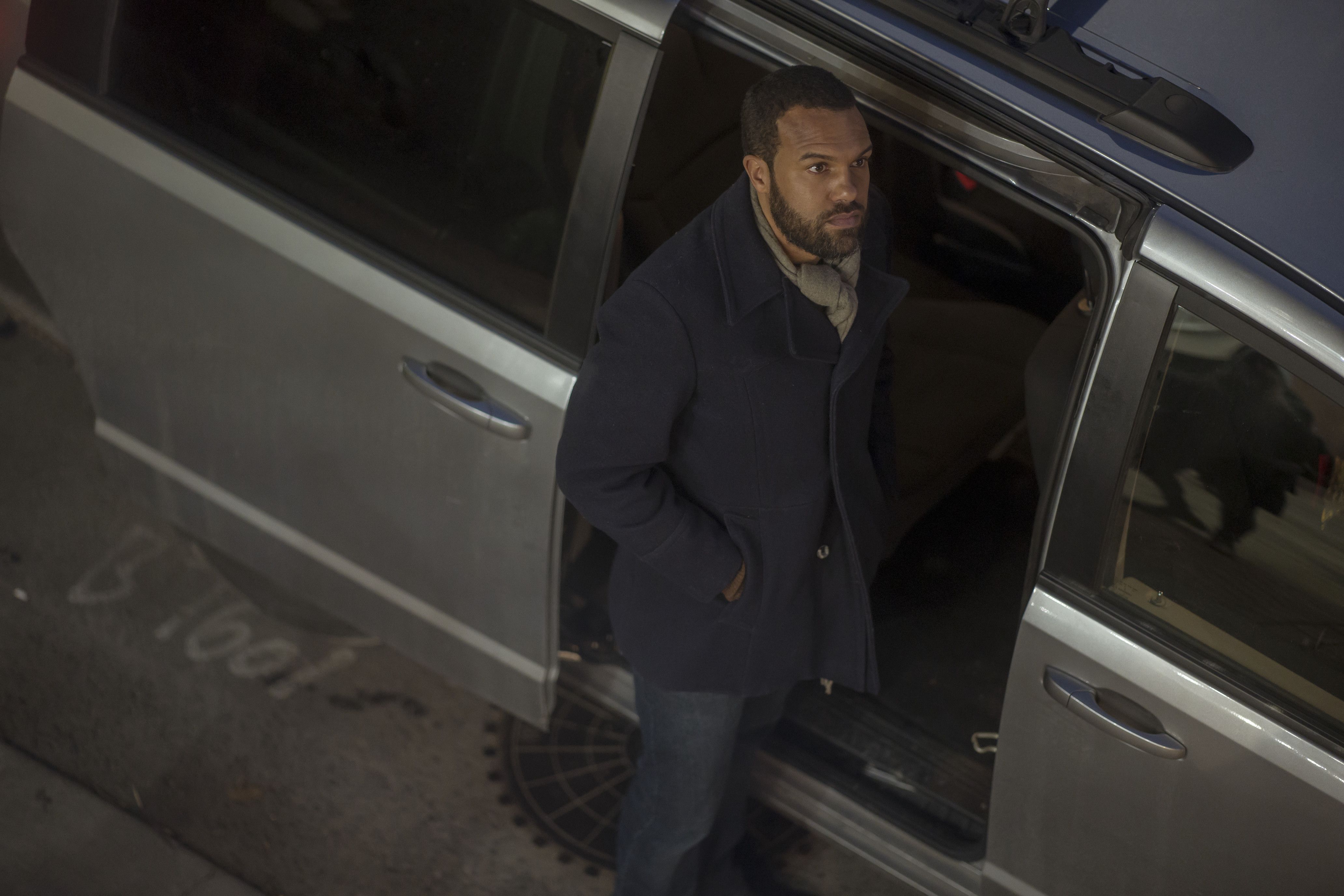O-T Fagbenle’s Luke has a lot to process in this week’s episode of The Handmaid’s Tale. After years of separation from his wife and daughter, he gets a call from an unknown number. It’s June (Elisabeth Moss), her voice stilted because she is being closely monitored. An emotionally overwhelmed Luke has to pull it together when she asks for a strange favor: That he take baby Nichole to a Toronto airport to meet with Serena (Yvonne Strahovski).
During that tense, emotional confrontation, Luke’s intense distrust gradually gives way to a kind of wary curiosity as Serena’s love for Nichole becomes clear. But there’s even more emotional upheaval to come for Luke later in the episode. Serena brings to Canada a tape recording from June in which she briefly recaps her time in Gilead, confesses to her affair with Nick, and reveals that Nichole is Nick’s daughter—not Commander Waterford’s.
Fagbenle spoke to BAZAAR.com about the tangled June/Luke/Nick love triangle, Luke’s complex feelings about Serena, and why he loves that Luke is “the anti-Liam Neeson.”
Harper’s Bazaar: This is a big episode for Luke. How did you react when you got the script?
O-T Fagbenle: I was really excited for him, and for me! I feel so connected to Luke at this point that I often get us muddled. He’s dealing with a strange dichotomy because on one hand, the child that you’re looking after wasn’t a product of rape, thank God. But on the other hand, to deal with the fact that actually, it was a product of love … It’s a really weird place for him to be. And how does that change his relationship to Nichole? She’s an innocent child and that hasn’t changed, but what that child represents has changed, so that was really interesting to explore.
HB: This storyline really began towards the end of last season, when Luke meets Nick but doesn’t know the full story yet.
OF: One of the things I like about playing Luke is his impotence, in a way. He loves his wife and family so much and yet he is completely unable to help them. He’s not gonna stuff a Kalashnikov on his back and run into Gilead, because most men can’t do that. If he tried to do that, he’d be killed. So he has to sit there with the reality of his incompetence and his lack of knowledge and his lack of capacity to help. When Nick comes into that scene, Luke is both lashing out at the one symbol he has of the loss, and at the same time, desperate for any news, any knowledge, any little morsel of his wife and child.
HB: Luke’s not about to pull a Liam Neeson in Taken: “I’m gonna get my wife and daughter back…”
OF: [Laughs] Luke is the anti-Liam Neeson: “Taken: So Live With It.” There’s a scene in the very first episode where you see Luke try and load the gun, and he’s just incompetent at it. That to me was one of the main keys to the rest of the series: He is not that guy. He will carry the baby and change the diapers, but he doesn’t know how to handle a gun.
HB: And Nick is closer to that traditional action-hero ideal. He’s a former soldier, he can run in with a gun and save the day, he represents a lot of what Luke isn’t, right?
OF: Right, exactly, and what they represent for June. It’s like, Luke and his cardigans, and then you’ve got sexy Nick with his dark mysterious masculinity. They’re juxtaposed in so many ways. And Max [Minghella] plays Nick with so much range as well. He’s not just some kind of brooding hunk. He’s also sensitive and curious and all those things.
HB: But cardigans aside, Luke is sexy! The heat between him and June is really emphasized in this episode with those glimpses of you guys in the club.
OF: You know, I always joke with my friends when they ask me what parts I’ve been playing on TV, because I’m sort of a professional boyfriend. I play people’s boyfriends quite a lot. And sometimes you have a chemistry with the person and sometimes you don’t, and you have to fake it. Luckily, me and Lizzie [Moss] just got on. We got each other right away. We’d go out dancing together. We have a natural kind of good vibe between us, so shooting those scenes is the easiest thing in the world for me. Apart from her extraordinary capacity for depth and nuance and pathos, she’s also a lot of fucking fun, so those are as easy as pie.
HB: Was she actually acting opposite you in that phone call scene?
OF: Yeah, she was on the other end of the phone when we shot it. Most of the time with those scenes, you have some assistant director who’s not really focusing on the reading of it and you have to read opposite that and try to emote. Lizzie, with her generosity, was there on the other end of the line so we could do the scene. It’s heartbreaking for Luke—and for me playing—hearing her voice for the first time. I’m wondering all that she’s been through, and what it’s like to speak to someone who you know has been traumatized and who you love so much.
“It’s very hard to hate someone when they’re being really loving to a baby.“
HB: Luke goes into his meeting with Serena pretty hostile, understandably. How does his mindset shift during that scene?
OF: It’s complicated because once again, Luke is faced with meeting his oppressor—the nemesis of his family, in a way. But she also holds so many keys to June’s possible liberation and safety. On one hand, Luke wants to lash out, and on the other hand, he wants to get a confidant and someone who’s on his side. And at the same time, there’s this impossibly heartbreaking performance that Yvonne is giving. From the character’s perspective of seeing this woman with her baby, you know—that maternal love is undeniable. I have to tell you what a privilege it was to sit opposite Yvonne and watch her act, because she’s knocking this shit out of the park! It’s just a masterclass. And so that’s really hard to contend with as well. It’s very hard to hate someone when they’re being really loving to a baby.
HB: Even before Luke meets Serena, his condition for the meeting is “Not him, just her.” Is that because Serena is a more of a gray area for him than Fred, who he just can’t bring himself to deal with?
OF: Yeah, I think so. Being in proximity to someone who has hurt someone you love, especially with sexual violence … I think for Luke, he might not be able to look out for June’s best interests if he had the Commander in front of him.
HB: Your last scene in Episode 5 is Luke reacting to the tape June has recorded, where she confesses to the affair with Nick. What it’s like to play such an emotional one-sided scene?
OF: Lizzie once again recorded her lines on the tape, so I actually had her telling the story on the tape in her voice. That was helpful because now that we’re so far into it, [hearing her voice] does trigger me, it affects me. That episode was also Colin Watkinson’s directorial debut. Colin was the DP who, along with Reed Morano, set the look for Handmaid’s. He’s just an extraordinarily beautiful man, and having him with me to shoot that scene and to create an atmosphere and to help guide me through that was invaluable.
HB: On the tape, June essentially tells Luke that if he needs to move on and find someone to be with, she gives her blessing. Do you think he’s capable of that?
OF: No. It’s weird because I think when you’ve been away from someone like that, memories are funny things, and they become symbolic for you. They become a refuge to you. In a way, his life has been built around trying to find ways to get his family back, but also coping with the grief of the loss. In that scene, the idea of her letting him go really still represents her love for him. She’s saying to him, “Hey listen, if you need to find love as well,” but I think he’ll be incapable of doing that.
HB: Luke’s interactions with Moira and Emily are interesting. There are these moments where he’s awkward and clumsy and just doesn’t get what they’ve been through, and Moira has to check him. What’s your take on that dynamic?
OF: I think one of the problems of being a man is you don’t get it, a lot of times. And sometimes it takes a lot of listening to women’s experiences so you can have some semblance of understanding. But you can never know what it’s like. I think those scenes, where Luke is with women who have been through the most terrible trauma and has an inability to deal with that in a mature, empathetic way, because he’s dealing with his own issues … I think it’s tapping into something relatable, which is, how do you effectively empathize? I think Luke fails at that a lot.
HB: And he’s not trying to be cruel or insensitive. He’s just thoughtless, which is more uncomfortable to watch, in a way.
OF: Right, because it’s much easier to deal with the person who’s trying to be cruel, who is an ignorant sexist or racist or whatever. You know where to put them. There’s a box for those people, in a way. But the well-meaning person who says the wrong thing or fails to empathize, the consequences of their actions are the same. It’s a lot more complicated to deal with those situations and people, and I think that’s something the writers deal with well this season.
Source: Read Full Article
